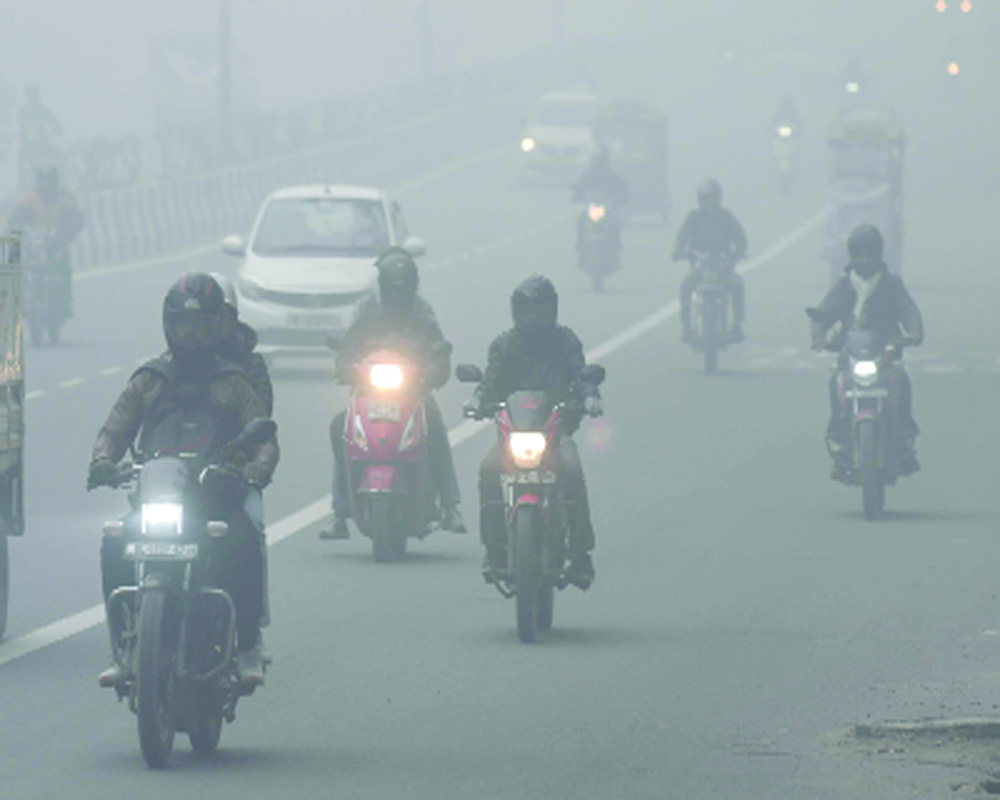The Centre on Wednesday re-imposed Stage-IV of the Graded Response Action Plan (GRAP) in the Delhi-National Capital Region (NCR) after air quality deteriorated. GRAP Stage IV curbs include a ban on all construction activities, the entry of non-essential polluting trucks into Delhi, and mandatory shifting of school classes, except for classes 10 and 12, to hybrid mode. Non-essential diesel trucks are prohibited from entering Delhi, while Delhi-registered BS-IV and older diesel-run heavy goods vehicles are banned, except for essential services, with exceptions for essential services and adapted vehicles for persons with disabilities under Stage IV.
The maximum temperature was recorded at 18.1 degrees Celsius, while the minimum temperature stood at 6.1 degrees Celsius, two notches below normal on Wednesday. Calm winds, low temperatures, and foggy conditions allowed the accumulation of pollutants in the region, with the air quality index soaring from 275 on Tuesday to 396 at 6 p.m. on Wednesday.
Following this, the Commission for Air Quality Management (CAQM) subcommittee decided to invoke all actions under Stage-III (‘Severe Air Quality of Delhi’) and also Stage-IV (‘Severe+’ Air Quality of Delhi) of the extant Schedule of GRAP, with immediate effect, in addition to the Stage-I and II actions already in force, the statement read.
Unfavourable meteorological conditions, combined with vehicle emissions, paddy-straw burning, and other local pollution sources, have led to hazardous air quality levels in Delhi-NCR during winters. Forecasts by the India Meteorological Department (IMD) and the Indian Institute of Tropical Meteorology (IITM) suggest the AQI could soon cross the 400 mark.
A dense fog lowered visibility to zero in the national capital and surrounding areas early Wednesday morning, delaying dozens of flights and trains. At least 13 flights have been cancelled, and 400 others delayed so far due to dense fog at Indira Gandhi International Airport. As many as 26 trains bound for Delhi are also running late, and the timings have been changed for six trains. Early morning travellers faced difficulties in navigating through the dense fog. Due to zero visibility reported in parts of Delhi-NCR, road traffic also slowed down in Delhi and nearby cities due to the reduced visibility.
“All actions of the GRAP schedule shall be implemented, monitored, and reviewed by all the agencies concerned in the entire NCR to ensure that the AQI levels do not slip further. All implementing agencies shall keep strict vigil and intensify measures of the GRAP schedule. Citizens are requested to strictly adhere to the citizen charter under GRAP,” the statement added. On January 12, the CAQM revoked Stage-III restrictions after the AQI in Delhi improved due to rainfall.
The Sub-Committee highlighted a significant rise in pollution levels, with the AQI jumping from 275 on January 14 to 393 by 5:00 PM and 396 by 6:00 PM on Wednesday. This surge is attributed to dense fog, low temperatures, and poor atmospheric conditions that hinder the dispersion of pollutants.
To tackle the worsening air quality, CAQM has enforced the 9-point action plan under Stage-III and the 7-point action plan under Stage-IV across the NCR. The concerned agencies, including state Pollution Control Boards (PCBs) and the Delhi Pollution Control Committee (DPCC), have been directed to implement these measures promptly and strictly.
























